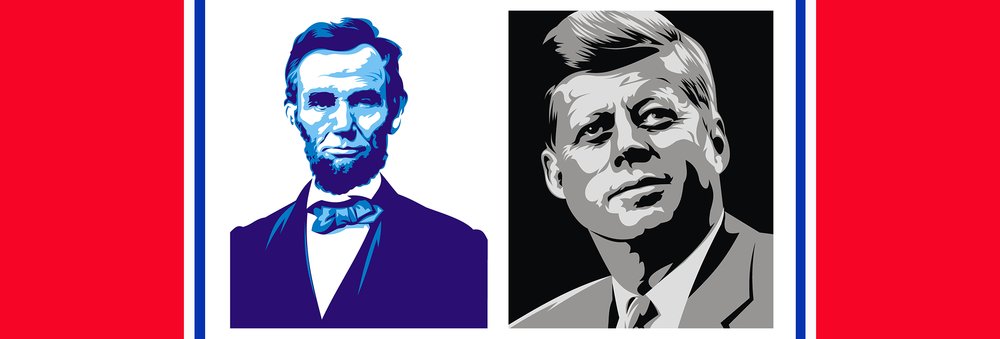(585) 352-1500

Death of a Statesman (Part II)—U.S. State Funeral Honorees
As noted in our May 24, 2017 blog - Death of a Statesman - Honoring Our Esteemed Leaders: In Death, “state funerals” are held in just about every country in the world. Such events serve to honor deceased leaders and others of national significance, as well as provide an opportunity for the general populace to participate in the mourning process. In the cases of especially popular leaders and public figures, these public ceremonies serve as a catharsis for a nation’s collective grief, as the citizenry tends to bond together in mutual solace.
Perhaps no other funeral in American history represents this as succinctly as the services held over three days for our 35th President, John F. Kennedy, after he was killed by an assassin on Nov. 22, 1963. In fact, in many ways President Kennedy’s funeral briefly brought the entire world together in collective mourning. No U.S. funeral before or since has brought so many world dignitaries, 220 from 92 nations including 19 heads of state, together making it the largest gathering of foreign dignitaries in U.S. history. Additionally, as one of the first world-wide televised state funerals in history, Kennedy’s stands as one of the most watched funeral ceremonies in history, with an estimated television audience of 180 million.
But what of the other U.S. state funerals? What about George Washington or perhaps Franklin Roosevelt? How have the other official U.S. state funerals served the country and its citizens, and which ones may have approached the level of national, if not international, mourning like that displayed by President Kennedy’s state funeral?
As noted in the previous blog, there have been 18 official state funerals held in the U.S. since its founding, with such funerals honoring 12 presidents, as well as six other people who received the honor by presidential designation. George Washington and other founding fathers did not receive official state funerals, as no protocols for such had been established yet. That said, the first official U.S. government funerary act was a proclamation of general mourning upon the death of Benjamin Franklin in 1790. Franklin was duly honored across the country, as well as in France, which declared a three-day period of mourning, and about 20,000 mourners gathered in Philadelphia for his actual funeral services.
A similar proclamation of mourning was proclaimed upon the Dec. 14, 1799 death of George Washington. While Washington’s actual service was small and held on his Mount Vernon property, the nation mourned and pseudo funeral services were held across the country in his honor. Other founding fathers (and early presidents), such as Thomas Jefferson and John Adams, received public accolades but no official funerary honors, and generally tended to be laid to rest with relatively small services.
President William Henry Harrison is recognized as being the first person to be honored with an official U.S. state funeral. If your initial reaction to this bit of information was something along the lines of “President William Henry who?” don’t concern yourself about an apparent lack of U.S. history knowledge or wonder whether you slept through that part of your high school history class, as President Harrison only served as our president for 32 days before falling ill and dying of pneumonia in 1841. The fact that he was the first president to die while in office likely initiated that first official state funeral.
And, compared to Kennedy’s services, Harrison’s can be considered especially modest, though it did start establishing state funeral protocols, such as the processional and its accompaniment by military marching bands. One early protocol that did not last until the 20th century was the draping of the White House in black ribbons.
President Zachary Taylor, who also died while in office, was honored with the nation’s second state funeral in July 1850. His official services were reportedly quite similar to those of President Harrison’s.
The April 14, 1865 assassination of President Abraham Lincoln gave rise to the nation’s third state funeral, and the first example of true national mourning for the still relatively young country. Four days of assorted funeral-related services were held in the capital, and then the president was further mourned during a two-week journey across the country by train, with stops in various locations where the president’s body lay in state so that his memory and service could be commemorated by the local populace. It is estimated that more than 7 million Americans either partook in the various ceremonies or viewed the train during its slow processional route.
President Lincoln was also the first president to lie in state in the U.S. Capitol rotunda, and many aspects of the Washington, DC-related portion of his funerary services became loose benchmarks for state funerals to follow.
In fact, upon the death of President Kennedy, his widow, Jacqueline, directed planners to follow the same state funeral services relating to lying and state and the processional that were provided to President Lincoln during the Washington, DC portion of his services. Various top-level staff were reportedly up all night following the assassination, searching for and reviewing Lincoln funerary documents in the Library of Congress in an effort to meet the presidential widow’s request.
Four presidents (former and active): James A. Garfield, William McKinley, Warren G. Harding and William Howard Taft were accorded state funerals between those provided to Lincoln and Kennedy. Perhaps noticeably absent from this group is President Franklin D. Roosevelt, the only four-term president considered instrumental in navigating the U.S. out of the Great Depression and successfully guiding the country through the turmoil of World War II.
Apparently, Roosevelt’s family, with government official concurrence, thought that a lavish state funeral would be inappropriate during time of war when so many other American families were experiencing losses. Thus, the president, who died on April 12, 1945, was honored by small, private services in Washington, followed by a low-key funeral train procession to his interment in Hyde Park, New York. Despite the lack of a state funeral, and in spite of the war, the country did experience a short, but powerful, period of national mourning.
Shortly after his death and interment, the president’s own wishes, with regard to his funeral services were discovered. In a four-page handwritten document, the president had requested that there be no “lying in state,” and that services be kept small and “to the utmost simplicity,” all of which had been inadvertently carried out per his instructions.
Dwight D. Eisenhower, Lyndon B. Johnson; Ronald Reagan and Gerald Ford mark the last four presidents honored with a state funeral since Kennedy’s. Of the four, Reagan’s was carried out with the most pomp and sense of national mourning, with a seven-day service, more than 100,000 partaking in Washington, DC services and a television audience of more than 35 million.
None of the six non-presidential recipients of a state funeral came close to reaching such numbers, or of invoking a sense of national mourning, but their lives are worth remembering as well. We’ll look at the official state remembrances of their lives in a future blog.
Interesting links:
John F. Kennedy Funeral Procession:
http://www.nbcnews.com/video/nbc-news/53492193#53492193
Article on Abraham Lincoln’s Funeral Train:
http://ngm.nationalgeographic.com/2015/04/lincoln-funeral-train/goodheart-text



Comments